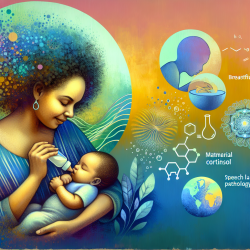Understanding the Impact of Maternal Cortisol and Breastfeeding on Infant Growth
As practitioners focused on optimizing child development outcomes, understanding the factors influencing infant growth is paramount. Recent research by Aubuchon-Endsley et al. (2020) titled "Maternal Prenatal Cortisol and Breastfeeding Predict Infant Growth" offers valuable insights into how maternal prenatal cortisol levels and breastfeeding practices can shape infant growth trajectories.
Key Findings from the Research
The study explores the relationship between maternal prenatal cortisol levels, breastfeeding, and infant growth. The research suggests that:
- Maternal prenatal cortisol, particularly the cortisol awakening response (CAR), is negatively associated with infant length-for-age z-scores (LAZ) at birth but positively associated at 13-14 months, indicating catch-up growth.
- Breastfeeding frequency and duration are negatively correlated with weight-for-length z-scores (WLZ) and LAZ at 10 months, suggesting breastfeeding's role in managing healthy growth.
- No significant interaction was found between prenatal cortisol and breastfeeding in influencing growth, indicating other factors may contribute to growth trajectories.
Practical Implications for Practitioners
For practitioners in the field of speech language pathology and child development, these findings underscore the importance of considering both prenatal and postnatal factors in infant growth:
- Screening and Monitoring: Regular monitoring of maternal stress levels and cortisol during pregnancy can help identify infants at risk for growth issues. Early intervention strategies can be developed for those with elevated cortisol levels.
- Encouraging Breastfeeding: Promoting breastfeeding as a practice can support healthier growth patterns in infants, potentially reducing the risk of obesity and related health issues later in life.
- Holistic Approach: Given the complex interplay of factors affecting growth, a holistic approach that considers maternal health, infant feeding practices, and other environmental factors is essential for optimizing child development outcomes.
Encouraging Further Research
While this study provides significant insights, it also highlights the need for further research to explore the intricate relationships between prenatal cortisol exposure, breastfeeding, and infant growth. Practitioners are encouraged to engage in or support research efforts that aim to uncover additional factors influencing growth trajectories and develop targeted interventions.
To read the original research paper, please follow this link: Maternal Prenatal Cortisol and Breastfeeding Predict Infant Growth.










